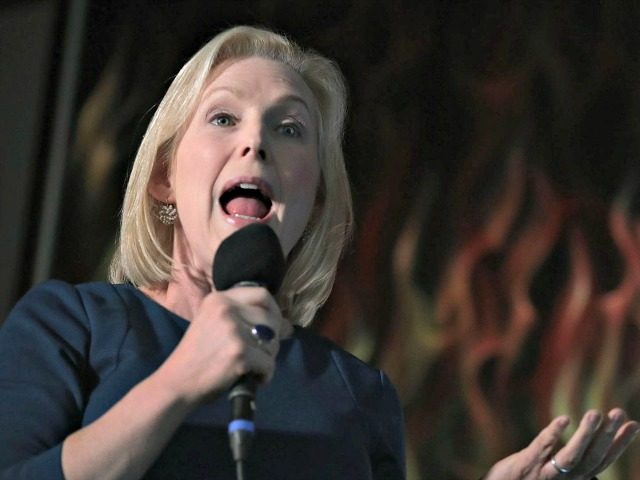Sen. Kirsten Gillibrand’s (D-NY) presidential campaign spent nearly $370,000 on Facebook advertisements over the past 30 days in an effort to secure a spot in the first Democratic presidential primary debate.
An analysis of Facebook’s digital ad archive shows Gillibrand purchased 910 ads totaling $369,354 since May 4, making her the platform’s seventh largest spender on political ads. The overwhelming majority of the ads have been targeted at women of all ages, across all regions, but with an emphasis on the coasts.
The ads typically solicit help to ensure Gillibrand reaches the donor threshold required to “lock up” a spot at the Democratic National Committee’s (DNC) first primary debate, scheduled for June 26-27 in Miami, Fla.
“I didn’t get into this race expecting to coast, because I’ve always been discounted—and I’ve always been an underdog,” one ad from May 18 reads. “But the DNC’s rules may keep me off the national debate stage. Give $1 today to guarantee my voice can be heard in this campaign.”
Other ads have cited cultural issues like abortion, which Gillibrand has attempted to use to jumpstart her campaign in recent weeks, to spur donations.
“We’re facing an all-out assault on women’s constitutional rights, explicitly aimed at overturning Roe v. Wade,” reads an ad from May 20. “Reproductive rights are non-negotiable, and we need to join together to defend them… We have to make sure I’m on the debate stage in June so I can make sure reproductive rights get the attention they deserve. Can you donate $1 right now to help guarantee my spot?”
The ads have only grown in scale, as 19 candidates have already qualified for the first debate ahead of the DNC’s June 12 deadline. On Sunday alone, Gillibrand’s campaign spent more than $28,000 on 101 ads.
“The DNC could CUT candidates from the stage if they don’t have 65,000 individual donors. We haven’t hit that goal yet, and the debates are less than 30 days away,” an ad from that day states. “So take a second to answer this important question: Do you want to see Kirsten Gillibrand on the debate stage in June?”
The DNC, which drew criticism in 2016 for what many viewed as its attempt to “rig” the debates in favor Hillary Clinton, has set stringent criteria for qualification this time around.
To secure a spot at the first two debates, candidates must hit one percent in at least four state or national DNC-approved polls. Candidates are also eligible to qualify by raising 65,000 unique donations, with a minimum of 200 contributions from 20 different states. Attendance will be capped to 20 candidates, with spots prioritized for individuals able to meet both thresholds.
Despite representing a state with one of the largest media markets in the country, Gillibrand only registers at an average of 0.3 percent in national surveys, according to Real Clear Politics. This essentially ensures she will be unable to qualify for the first debate via polling, explaining her campaign’s strong push to cross the 65,000 donor threshold.
The New York senator’s campaign did not return requests for comment on this story.
Gillibrand’s inability to qualify for the first debate underscores the problem many candidates face as they struggle to gain traction in la arge and fractured 24-person field. The DNC’s decision to restrict access to the third and fourth debates scheduled to take place over the fall, however, is likely to only make the situation worse.
For entry into those debates, candidates will need to be polling at two percent in four state or national DNC-approved surveys. Candidates unable to meet the polling requirements would be eligible to attend if they received 130,000 unique donations from at least 20 states. As in the first two debates, attendance will be capped at 20 candidates, with priority given to those who meet both requirements.
Although the tightened criteria is not insurmountable, it has the potential to benefit early frontrunners, such as former Vice President Joe Biden, at the expense of lesser known candidates like Gillibrand.

COMMENTS
Please let us know if you're having issues with commenting.